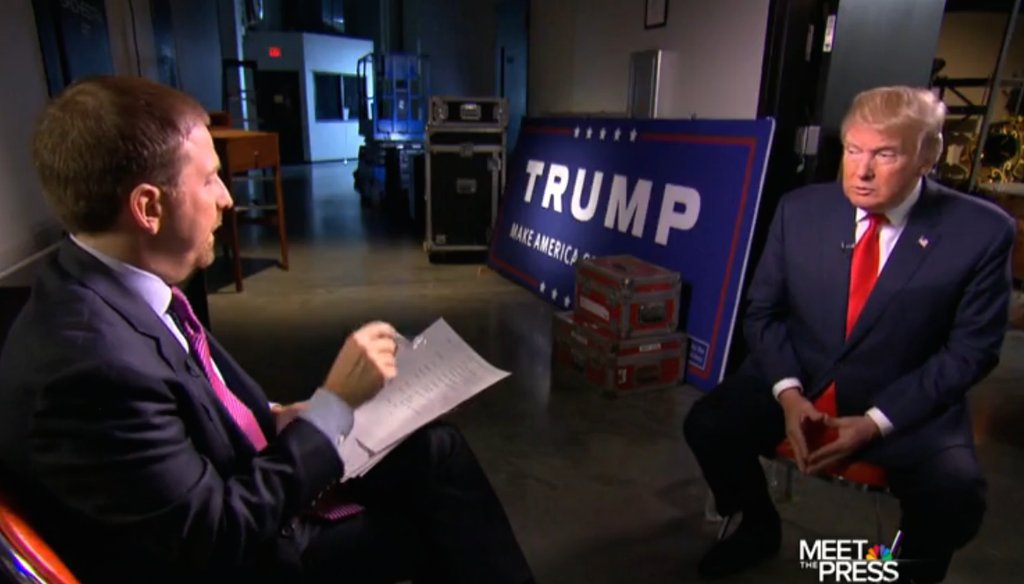Stand up for the facts!
Our only agenda is to publish the truth so you can be an informed participant in democracy.
We need your help.
I would like to contribute

Chuck Todd interviews Donald Trump on the Jan. 10, 2015, edition of "Meet the Press."
New polling shows Donald Trump is neck-and-neck with Texas Sen. Ted Cruz to win the Iowa caucuses for the Republican nomination for president. In interviews from Iowa on Sunday, Trump focused on foreign policy, continuing to criticize President Barack Obama and urging a change of course.
Trump hammered Obama for being a poor negotiator, particularly for Obama’s controversial decision to exchange five Guantanamo detainees for Army Sgt. Bowe Bergdahl, a Taliban prisoner, in May 2014.
"You look at these deals," Trump said to NBC Meet The Press host Chuck Todd. "I always bring up Bergdahl. We get a traitor, they get five people that they've wanted for nine years, and they're back on the battlefield, trying to kill everybody, including us. And we get a dirty, rotten traitor."
Trump’s statement about the detainees being back on the battlefield rates False.
The five detainees were released to the supervision of the Persian Gulf nation of Qatar in 2014. Qatar is understood to be a neutral state, as opposed to a "battlefield" for insurgent activity. Under the agreement, the five released detainees are not allowed to leave the country.
This travel ban was initially supposed to last one year, ending June 1, 2015, but it has been extended.
Multiple administration officials told us the detainees haven’t left Qatar. We found no evidence to contradict that.
In fact, in December 2015, the Republican-controlled House Armed Services Committee produced a report in which it expressed concern that the Taliban Five pose a security risk. But the report noted that the security arrangements first made in 2015 had been extended so that the five would remain in Qatar.
The State Department confirmed to PolitiFact that the men are still in Qatar.
"None of the five individuals has returned to the battlefield," said State Department spokeswoman Liz Trudeau. "All five men are subject to a travel ban, and none have left Qatar."
"They’re still in Qatar," added Myles Caggins, a spokesman for the National Security Council.
Of course, this doesn’t necessarily mean the former detainees aren’t trying to reconnect with the Taliban or other insurgent groups.
At least one of the Taliban Five is suspected by the United States of having attempted to contact Taliban associates. And Afghan intelligence officers arrested two suspected insurgents who tried to visit former detainee Mohammad Nabi Omari in Qatar, according to the New York Times.
But mere communications, or even giving orders from a distance, is not the same thing as literally being "back on the battlefield." Even if the Taliban Five has re-engaged in insurgent activities electronically -- a contention that we reiterate is not confirmed by publicly available information -- it would be a stretch to conclude that this counts as returning to the battlefield.
On South Korea troop presence
Trump also criticized the Obama administration for continuing a more long-standing policy: keeping troops in South Korea. North Korea recently purported to test a hydrogen bomb, bringing more attention to the region and North Korean dictator Kim Jong Un.
Trump said it was time for South Korea to pick up more of the costs of having United States military forces in South Korea.
"We have 28,000 soldiers on the line in South Korea between the madman and them," Trump said, referring to Kim. "We get practically nothing compared to the cost of this."
Trump’s statement rates Mostly False. South Korea does pay a significant amount to support the U.S. presence in South Korea. In the most recent agreement, announced in early 2014, South Korea said it would pay $866.6 million that year to support the U.S. presence. That was 5.8 percent higher than the 2013 amount, and that could grow by as much as 4 percent annually through 2018.
That presence includes roughly 28,500 military personnel -- far smaller than the roughly 500,000 South Korean service members on active duty, plus many more South Korean reserve troops.
Calculating the South Korean financial burden on a percentage basis is tricky, because it’s difficult to determine how much it "costs" the United States to station military personnel in South Korea. If you look at the most straightforward amount -- salary and benefits for 28,500 troops, which according to experts is roughly $100,000 a head -- then South Korea’s payments account for slightly more than 30 percent of U.S. costs in 2014.
"It's hard to argue that more than $800 million annually is ‘peanuts’ or ‘next to nothing,’ " said Lance Janda, a military historian at Cameron University.
Also, the United States benefits from its presence in South Korea, stabilizing the region and giving the United States a base from which it can project military power throughout the western Pacific, Janda said. The military presence also helps protect countries that buy U.S. products.
Reasonable people can disagree, Janda said, about whether South Korea is paying "enough" for the U.S. presence, and whether the United States might be better off protecting South Korea with air and naval power rather than a sizable ground presence.
Still, he said, "I don't hear Trump making nuanced arguments like that."
Our Sources
See fact-checks.















































